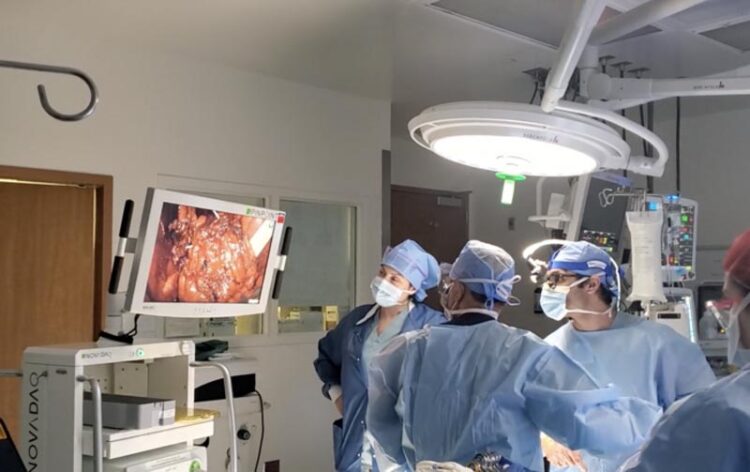Urologists to perform world’s first bladder transplant

The Keck Medicine of USC surgical team evaluates the integrity of a bladder during the research and development stage of bladder transplantation.
Photo courtesy of USC Urology
Surgeons with Keck Medicine of USC launch clinical trial to enroll first-ever bladder transplant patient after multiple successful research procedures.
No one has ever performed a bladder transplant in humans. But that may be about to change.
Urologists with Keck Medicine of USC have launched a clinical trial to perform the world’s first human bladder transplant.
The trial is actively screening potential participants for this first-ever type of transplantation.
During the procedure, the patient’s diseased bladder will be removed and replaced with a healthy bladder from a deceased donor.
“Transplantation is a lifesaving treatment option for conditions affecting many major organs, and transplanting a bladder could be a historic step in improving lives,” said Inderbir Gill, MD, founding executive director for USC Urology, part of Keck Medicine. Gill is also the principal investigator of the clinical trial and leading the transplantation efforts. “We could be on the verge of a medical advance that has the potential to revolutionize how we treat terminally compromised bladders.”
Hundreds of millions of people around the globe experience varying degrees of bladder disease and dysfunction. Some patients with these conditions may require a bladder reconstruction, a surgical procedure wherein the bladder is removed, and a new bladder is made from the patient’s own intestines. However, the procedure carries a high risk of early and delayed adverse side effects, and not every patient is a candidate for this surgery.
“The intention of this clinical trial is to develop a new treatment option for a certain subset of patients with debilitating bladder conditions that can severely hamper quality of life and ultimately, even shorten life,” said Nima Nassiri, MD, urologic surgeon and researcher with the Keck School of Medicine of USC and Gill’s collaborator on the clinical trial. “We have worked diligently to expand the boundaries of what is considered possible for severely compromised patients who traditionally have had few options.”
Bladder transplants have not been done previously, in part because of the complicated vascular structure of the pelvic area and the technical complexity of the procedure. Gill, Nassiri and their colleagues have spent the past few years developing and practicing numerous research procedures to prepare for the first-in-human bladder transplant, which will be done completely using robotic surgery.
Robotic surgery is an advanced form of minimally invasive surgery in which surgeons use a high-definition, three-dimensional camera to guide a robot to perform surgery using smaller, more precise incisions with more dexterity than is possible using hand-held surgical tools.
Under Gill’s direction, USC Urology has established itself as a pioneer and world leader in robotic, minimally invasive techniques for kidney, bladder and prostate cancer surgery, and achieved important milestones leveraging machine learning and artificial intelligence to optimize patient outcomes.
Keck Medicine’s USC Transplant Institute, which has a robust and nationally recognized kidney, liver, heart and lung transplant program, further provided Keck Medicine with the needed resources and skills to pioneer the first bladder transplant.
As part of the research and development stage, Gill, Nassiri and colleagues successfully completed many practice transplantation surgeries, including the first-ever robotic bladder retrievals and successful robotic transplantations in five recently deceased donors with cardiac function maintained on ventilator support.
The procurement, surgery and post-surgical monitoring during transplantation were aligned with current clinical and research standards. OneLegacy Foundation, an organ procurement organization serving Southern California, provided clinical trial funding and, with the generous agreement of donor families, enabled bladder donations that made the trial possible.
Nassiri and Gill are presenting their surgical research update April 30 at the annual meeting of the American Urologic Association, the world’s leading association for urology professionals.
Gill, in addition to directing USC Urology, is chairman and Distinguished Professor of the Catherine and Joseph Aresty Department of Urology and the Shirley & Donald Skinner Chair in Urologic Oncologic Surgery at the Keck School.
For more information about Keck Medicine of USC, please visit news.KeckMedicine.org.
Media Contact
Mary Dacuma Ferguson
University of Southern California – Health Sciences
mary.ferguson@med.usc.edu
Office: (323) 865-7839
Cell: (323) 865-7839
All latest news from the category: Medical Engineering
The development of medical equipment, products and technical procedures is characterized by high research and development costs in a variety of fields related to the study of human medicine.
innovations-report provides informative and stimulating reports and articles on topics ranging from imaging processes, cell and tissue techniques, optical techniques, implants, orthopedic aids, clinical and medical office equipment, dialysis systems and x-ray/radiation monitoring devices to endoscopy, ultrasound, surgical techniques, and dental materials.
Newest articles

Largest magnetic anisotropy of a molecule measured at BESSY II
At the Berlin synchrotron radiation source BESSY II, the largest magnetic anisotropy of a single molecule ever measured experimentally has been determined. The larger this anisotropy is, the better a…

Breaking boundaries: Researchers isolate quantum coherence in classical light systems
LSU quantum researchers uncover hidden quantum behaviors within classical light, which could make quantum technologies robust. Understanding the boundary between classical and quantum physics has long been a central question…

MRI-first strategy for prostate cancer detection proves to be safe
Active monitoring is a sufficiently safe option when prostate MRI findings are negative. There are several strategies for the early detection of prostate cancer. The first step is often a…



